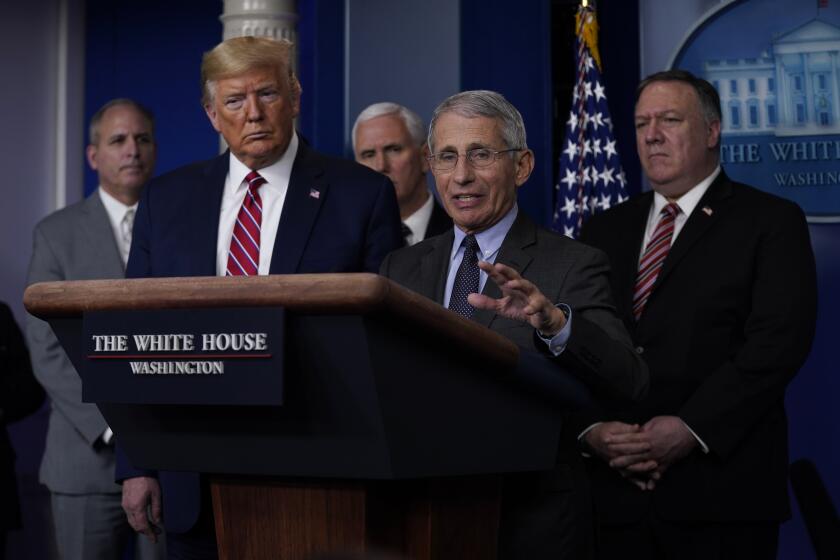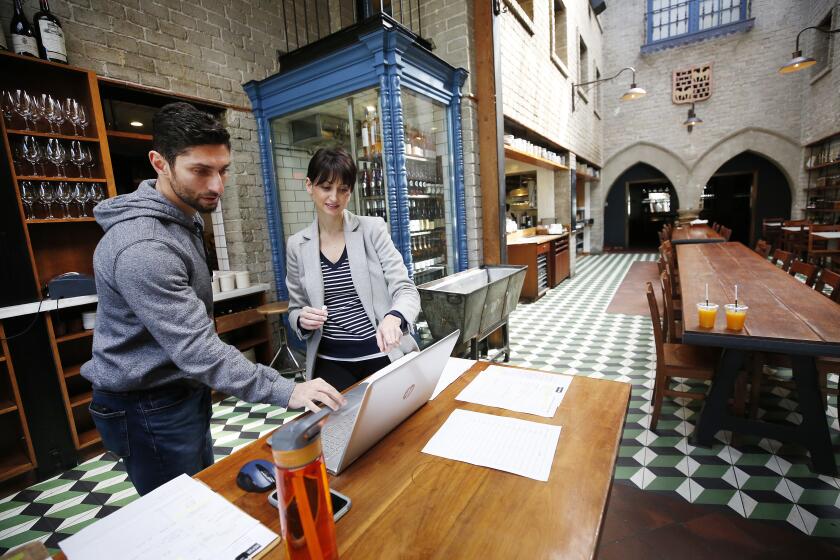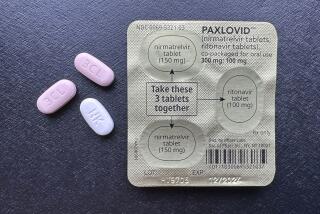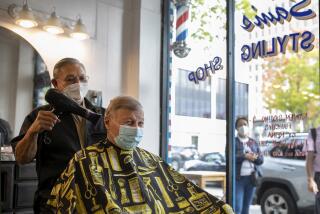Exactly how much power do we really want to give the government right now?
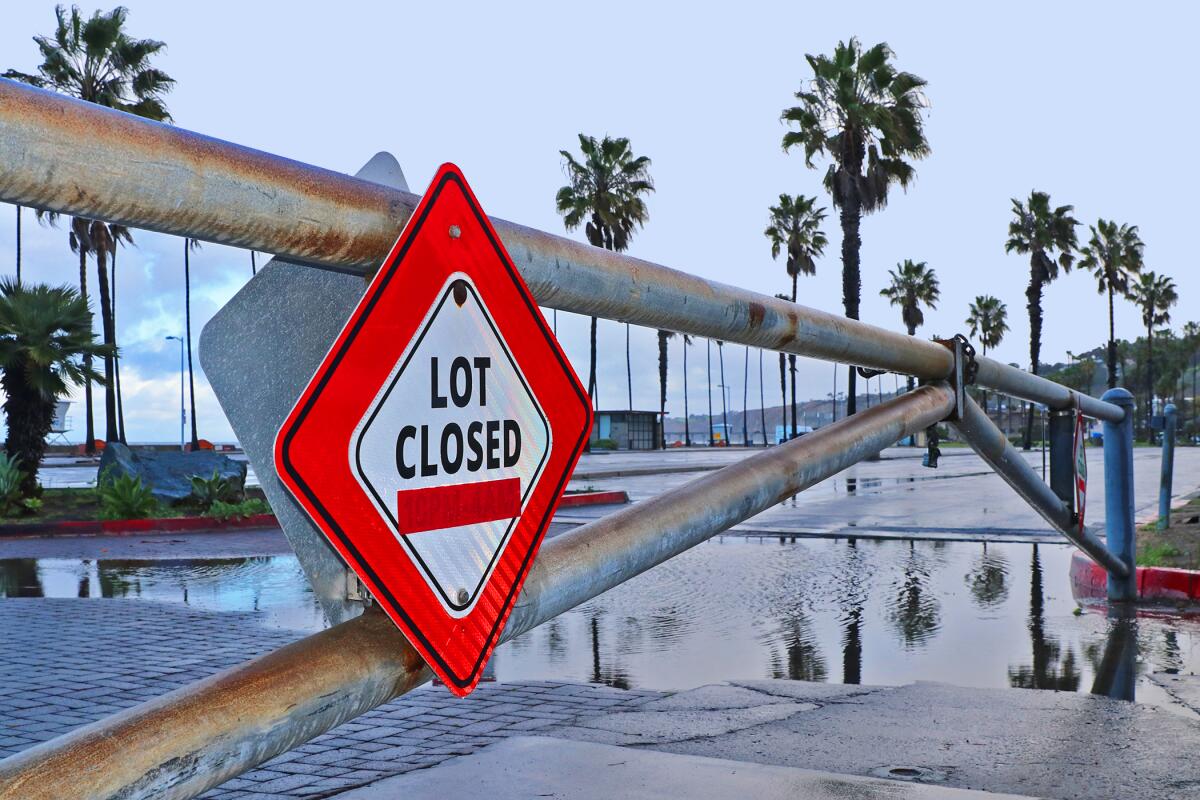
- Share via
The coronavirus outbreak is becoming a new ideological litmus test, but not the one we all thought it was going to be.
Sure, there’s the usual split between the Trumpian right, which has insisted throughout that the problem is under control, and the Pelosian left, which has been writing your grandmother’s obituary since late February. That’s reinforced by the greater prevalence of the virus in urban areas than in rural ones.
The U.S. is so politically polarized that even views of the coronavirus pandemic split along party lines, polls show.
But there’s also the gap between people whose businesses, incomes and quality of life are being strangled by the preventive measures some states and cities are imposing, and people who are still working in relative safety whose current circumstances aren’t so bleak.
The first group is stunned and alarmed at the raw display of power by governments that are slamming the brakes on commerce and throwing millions of people out of work, all in response to a virus that has sickened and killed far fewer Americans than the flu does every year. The second group looks at the rapidly rising numbers of people infected, hospitalized and killed by COVID-19 and can’t understand why anyone would even think of defying the social distancing guidelines.
The city is offering no-to-low-interest loans of $5,000 to $20,000 to small business hard hit by the coronavirus. Find out if you qualify and how you can get one.
The groups do not separate along partisan lines; the strongest determinants appear to be the effects the outbreak are having on your livelihood and your circle of friends.
I’m in the latter contingent, working from home alongside a wife and two sons who have managed to keep themselves reasonably busy. And I worry that I’m blithely supporting policies whose long-term benefits seem inarguable but whose short-term costs are more painful than I recognize.
My sister Carol Healey lives in the Bay Area, a hotbed for the coronavirus. Objectively speaking, she’s one of the world’s best humans, generous and empathetic to an extreme. And she happens to be in the group wondering if the efforts we’re making to rein in COVID-19 are causing more harm than the disease itself.
In an email Thursday, she lamented the assumptions we’re making about how to prevent the spread of the coronavirus, asking, “Where are the scientific studies of a population practicing frequent hand washing and social distancing but continuing to work at their jobs, to show that they are contracting this virus and spreading it, as compared to persons in shut-down businesses staying home except to walk their dogs, exercise, go to the grocery store and the pharmacy?”
That’s a good question, and I think the answer is that it’s too early for any studies to have been completed. But the evidence from Japan, which has taken the first approach, suggests that it’s not as effective as it initially seemed — the disease appears to be picking up steam, and local leaders are starting to call for a more stringent approach. And the experience in China and, more recently, Washington state makes clear that clampdowns work.
My sister readily conceded that we have to flatten the curve of coronavirus infections to keep hospitals and clinics from being overrun with patients. But she noted that most people who contract COVID-19 don’t need to be hospitalized.
“The people can handle social distancing, wearing gloves if out handling things, and self-quarantine if and when they are sick, coughing or sneezing,” she wrote. “People can handle putting off large-crowd events, concerts, sports, etc. The freedom-loving people in this country cannot handle being told they cannot work, cannot leave their homes, or that their business cannot continue because the public health requires it.
“Keeping us safe is the biggest killer of individual freedom ever invented by lawyers and politicians. It is an excuse used to perpetrate all kinds of oppression and of course enabled the rise of fascism.”
All true, and yet job No. 1 for every elected official in this country is to keep people safe. That’s especially true of local leaders, who are the ones issuing the guidelines and orders that are keeping most Californians under a loose form of house arrest.
And to me and others on my side of the debate, the threat posed by the novel coronavirus seems far, far greater than the other side acknowledges. The flu is not an apt comparison; not only is there no vaccine for COVID-19, there’s not even a proven treatment yet (although some may be arriving soon as tests ramp up). Even worse, people who test positive for the disease are being hospitalized at a rate that’s alarmingly high and growing. According to the COVID Tracking Project site, one out of eight people who has tested positive in the United States has wound up in the hospital. And that may be an undercount, because not every state that reports test results is disclosing COVID-19 hospitalizations.
As the number of COVID-19 patients in severe respiratory distress grows, hospitals will run out of intensive care beds. That means doctors and nurses will have to start deciding who will get potentially life-saving care and who won’t — not just among COVID-19 cases, but every victim of a potentially fatal injury or illness. Some systems are already preparing for that eventuality:
That’s why folks in my camp believe the first task is to beat this virus, even if doing so requires economically painful but necessary measures such as mandatory social distancing. In the meantime, Congress needs to do the sort of thing it’s doing right now, directing massive amounts of financial aid to the people and businesses whose livelihoods are being crushed.
But it’s not an easy call, not by any stretch of the imagination. I’ll give my sister the last words:
“So the question remains, will our leaders do this to us again next year, or for the next new virus without a vaccine, for the ‘public safety?’ ” she wrote in a follow-up email. “Will the hospitals be better equipped next time? Will we have enough components made in this country to enable us to quickly develop a vaccine and to supply billions of masks?
“There’s something very wrong where the only solution is to shut down the country and scrap individual freedom of movement. Let’s fix that.”
Amen to that.
More to Read
A cure for the common opinion
Get thought-provoking perspectives with our weekly newsletter.
You may occasionally receive promotional content from the Los Angeles Times.
